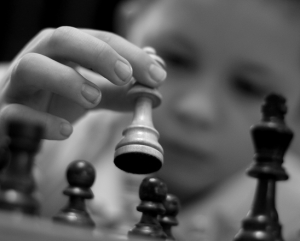 Team toughness is something every coach wants to improve.
Team toughness is something every coach wants to improve.
Surprisingly, one of the most significant coaching and leadership lessons I have ever learned about building team toughness was inspired by something I saw on Star Trek.
Seeing the “Kobayashi Maru” training exercise is where I first recognized the value of using no-win situations to test and improve team toughness. Most any “Trekkie” can tell you that this is the name of a test that places aspiring cadets in a no-win situation where they are faced with making difficult decisions.
The “Kobayashi Maru” is described as a disabled ship with 300 civilian passengers that has drifted into the Klingon neutral zone, which is off limits to Starfleet vessels and a
In this situation, the cadet can either:
- Attempt a rescue of the Kobayashi Maru’s and its passengers, which will violate the Peace Treaty and potentially provoke the Klingons into an all-out war; or
- Abandon the civilians on the Kobayashi Maru, likely preventing war but leaving all the crew and passengers there to certainly die.
If the cadet chooses to attempt saving the Kobayashi Maru, the computerized scenario progresses quickly. The bridge officers will notify the cadet that they are in violation of the treaty, and as the starship enters the Neutral Territory it loses contact with the Maru. Klingon starships will then appear almost instantly to attack..
Communication attempts with Klingons are met with silence, and the only response is their opening fire with what are devastating results. The computer allows the cadet no way to win the battle, and the simulation soon ends with the cadet’s ship being lost as well.
In truth, the real objective of the test is not to have the cadet outfight the Klingons, but to test the cadet and his or her decisions and reactions to what is a truly impossible situation.
The significance of this exercise is that, for coaches or leaders in any arena, if we can place our people in difficult (or impossible!) situations, it builds a toughness by forcing them to fail – and therefore offers opportunities to discuss how best to handle tough situations in the future with more poise and confidence.
Toughness has been defined many ways, including:
– Toughness is consistency
– Toughness is doing what’s right when things are going wrong
– Toughness is thinking “next play” instead of “last play”
– Toughness is not allowing your circumstances to affect your enthusiasm
– Toughness is performing well under stress
And while it may have many definitions, any coach or leader will readily admit that developing team toughness is one of the most important determiners of success. As Coach Tom Izzo has often said, “Players Play, but Tough Players Win.”
That is why the Marines are required to go through a final 54-hour “Crucible” before they graduate. It is a grueling experience that tests them physically, mentally, and morally – and includes many challenges that would be impossible without the toughness and teamwork their training emphasizes.
Adding an activity or drill that can place your people in impossible situations is incredibly important, and is one of the key components of building the culture of toughness that ALL strong organizations enjoy.
In basketball, perhaps coaches could require their normal starting five players to scrimmage against eight defenders to improve their ability to handle pressure. In football, coaches might add an extra rusher to force the quarterback to get rid of the ball more quickly or be more poised in passing situations.
For businesses, leaders might require their salespeople to role play with an impossible customer who presents every possible objection as an obstacle to completing the sale.
Put simply, you raise the bar and encourage growth and reflection when your people are placed in no-win situations and forced to fail – because failure is a learning opportunity.
Captain Kirk, in discussing the Kobayashi Maru test, explains that it is intended to reveal how a cadet handles a no-win scenario, because how a person deals with failure determines how soon he or she will enjoy future success. Failure is also a far better teacher than success, for when your people fail they are far more willing to seek and accept instruction and advice.
It is the teachable moments that no-win situations offer, as well as the toughness they inspire in from working against conditions that are more difficult than they will see in games or other circumstances, that make them so very valuable.
If you are searching for ideas or a unique event to test your team and build cohesiveness, consider a full or half-day of challenging Atlanta team building activities, or take advantage of these teamwork resources.
The team toughness that can result from putting them in difficult situations will surprise you!
